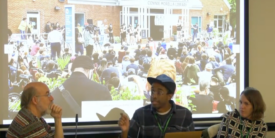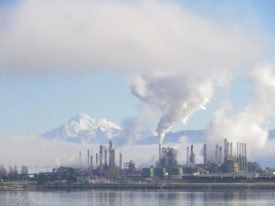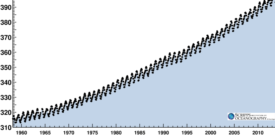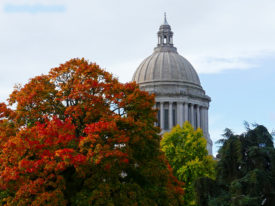Alan:
Among the dozen or so books I devoured this summer, the single best read was the second volume of the classic William Manchester biography of Winston Churchill.
This book recounts Churchill’s decade in political exile during the 1930s. England, like the rest of Western Europe, was deep in pacifist denial about the Nazi threat. Churchill, a ruling-party back bencher in parliament, stubbornly, valiantly, and almost single-handedly waged a campaign for national mobilization and rearmament. For his troubles, his party snubbed him, rebuked him, and ridiculed him. He lived on the edge of bankruptcy, supporting himself and his family entirely from writing books and articles late into the night. Yet at his own expense, he built up a massive personal network of intelligence sources and quiet supporters across the Western world, a network that made him better informed than the leaders of his own country. When events brought the public to his side — events, in this case, meaning German tanks rolling into France — and he became England’s Prime Minister, Churchill was ready to take the reins as few others could have been.
To me, the book reads as an allegory for today’s great struggle against climate change: the denial, the ridicule of us climate hawks, and the need for all of to be as unrelenting and undeterred as was Winston Churchill eight decades ago.
In other news: This Washington State Supreme Court ruling could prove very important. It clears the way to a carbon tax shift in the state, for one thing.
It also means that extending the retail sales tax to gasoline, by eliminating the exemption on motor fuels that’s currently in place, would generate general fund revenue, not highway funding. It also means the state could place taxes on motor fuels for other non-road purposes, such as support for the highway patrol or public transit or in-state rail service or multi-modal mobility education in schools or green infrastructure projects to absorb polluted runoff from highways.
Anna:
Climate change emerges as a sleeper issue in US Senate races (or as Joe Romm prefers it, “Dems use climate change to tag Republicans as extreme.”)
But can we count on elected officials to do the right thing? When asked a fairly simple probability question (chances of heads or tails in a couple coin tosses) by the Royal Statistical Society, far too many British MPs fail to get it right. It doesn’t bode well for their ability to make decisions on their constitents’ behalf when it comes to questions with far bigger stakes—like climate and energy policy. I wouldn’t put it quite this bluntly myself, but UK pundit Tim Worstall says: “This might help to explain why politics is such a bad and inefficient method of actually solving any problems. The politicians themselves seem sublimely ignorant of even the most basic facts about the universe that we inhabit.” (h/t JF).
Does the setting of maximum temperature thresholds basically guarantee the failure of international emissions reductions commitments? The answer, based on a simulation game played by 400 students, who played for real money, is yes. The problem, says Scott Barrett, a professor at Columbia University’s Earth Institute and a coauthor of the study, is that unless uncertainty about the threshold can be reduced to near-zero, individual countries have an incentive to do less than what would be required to avoid exceeding the threshold.
Eric dP:
As the parent of a downtown preschooler, I appreciated Jon Scholes case that Seattle should invest in a public school downtown. Many of the city’s center neighborhoods are seeing rapid growth in the population of the lunchbox set, yet the nearest schools are often distant and are already overcrowded. It makes sense to at least evaluate putting a school in an area that lacks one.
I’ve found plenty to disagree with him about over the years, but Bruce Ramsey’s argument for legalizing marijuana is pitch perfect. He identifies and neatly dispenses with nearly every objection to legalization. If there’s a more compelling and succinct case statement out there, I haven’t seen it. Like so:
In the matter of intoxicants, demand creates supply. It has always been so. The question for government is, do you send in the tax man or the police?
It depends on what you want, revenue or prisoners.
Although actually this is the one topic where I wish Ramsey had expanded his argument. As the NAACP and other civil rights groups argue, the disproportionate impact of marijuana enforcement on low income people and people of color is one of the strongest reasons to concede that prohibition has been a miserable failure.
Clark:
After major gains in the 1970s and 1980s, the average fuel economy of the US vehicle fleet stalled out—rising from just 16.9 mpg in 1991 to 17.2 mpg in 2007. (These numbers include cars, trucks, buses, motorcycles, and everything else on the road.) Since 2007, though, fuel efficiency has started to tick upwards again, according to a new analysis by University of Michigan’s Transportation Research Institute. Between October 2007 and September 2012, the fuel economy of new light duty vehicles (cars, pickups, minivans, and SUVs) rose from 20.1 mpg to 23.8 mpg. And those efficiency gains have added up to nearly 6.1 billion gallons of fuel saved!! That may sound like an awful lot, yet it’s the equivalent of just 13 days of fuel use in the US. But hey, every little bit helps!!
Marc Lee of the Canadian Center for Policy Alternatives, BC Office, has a killer new report on the good, the bad, and the ugly in BC’s climate policy. The good: BC’s overall climate-warming emissions declined between 2007 and 2010, driven largely by greater efficiency in homes and commercial buildings (coupled with a manufacturing sector that was hit hard by the recession). The bad: emissions from fossil fuel extraction are way up—and are likely to grow even higher in the next few years. And those problems are compounded by the large potential “fugitive” emissions of methane, a potent global warming gas, from natural gas extraction. The truly ugly: the province is in a mad dash to export fossil fuels, particularly liquefied natural gas, to other parts of the world—leading to increased emissions that would absolutely swamp any improvements in BC’s own climate performance.
Real-life levitation! (Thanks, science!!)









klem
“..extending the retail sales tax to gasoline, by eliminating the exemption on motor fuels that’s currently in place, would generate general fund revenue, not highway funding.”
Sounds great, this has been done in Canada for several decades. Canadians now pay just over $5 for every gallon of gas and the high price has helped fund the exploration and development of the Alberta tar sands. Way to go.
Alan Durning
Thanks for your comment, Klem, but I do not understand your reasoning.
British Columbia’s Provincial Sales Tax used to cover gasoline. Now, with the Harmonized Sales Tax, I’ve lost track of what’s included. Still, the revenues from the sales tax go to the province of British Columbia, which spends nothing on exploration and development of Albert tar sands.
The Canadian federal value-added tax (called the GST) applies to all products, so I think it touches gasoline, too. But it’s not a sales tax. Are you saying that the proceeds from the GST help fund publicly supported exploration and development of Alberta tar sands?
Or are you simply saying that high prices for crude oil motivate private companies to explore and “develop” (aka, extract) Alberta tar sands? If so, you’re certainly right, but taxes on gasoline (whether motor fuel taxes, provincial sales taxes, harmonized sales taxes, or value-added taxes) do not raise the price of crude oil that oil companies receive. To the contrary, they suppress demand for gasoline, thereby lowering sales and arguably reducing the profitability of oil companies’ exploration and development of Alberta tar sands.
Taxes put a wedge between what consumers pay and what oil companies get.